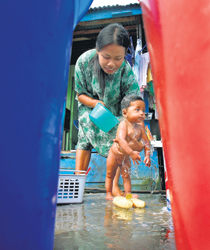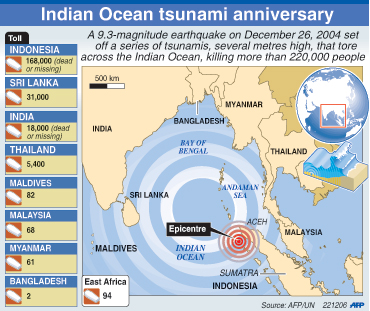
|
tsunami: 2 years after ~ Rising from ruins BANDA ACEH, Indonesia, Dec 22, 2006 (AFP) - Two years after the tsunami killed some 220,000 people, Indonesia's Aceh province is on the road to peace and tourists are flocking to Thailand's beaches. But in Sri Lanka conflict and corruption are threatening efforts to rebuild after the disaster. Early on December 26, 2004, a magnitude 9.3 earthquake off the Indonesian island of Sumatra triggered an ocean-wide tsunami that killed people thousands of kilometres (miles) apart on opposite sides of the Indian Ocean.
The killer waves were felt as far away as Somalia and the Maldives but it was on Indonesia, Sri Lanka, India and Thailand that it unleashed its full fury. Aceh on the northern tip of Sumatra was the closest point on land. In minutes, the towering wall of water destroyed more than 800 kilometres (500 miles) of Aceh's coastline, killing more than 168,000 people and leaving more than 600,000 homeless. Nearly two years after the disaster, a massive reconstruction effort is underway, funded by the billions of dollars which flooded in from around the world in an unprecedented outpouring of generosity. According to schedule, 48,000 of the 128,000 homes needed have already been built, said Kuntoro Mangkusubroto, director of the Aceh Reconstruction and Rehabilitation Agency.
But around 50,000 survivors remain in temporary wooden barracks. Johan Schaar, the International Federation of Red Cross and Red Crescent Societies' special tsunami representative, said the pace of reconstruction was picking up after an initially slow start. "Last year was slow, you did not see much progress in actual physical recovery, but coming back now... I think it's really amazing to see what is happening, the rate of reconstruction, how many houses are being built and the sheer activity of reconstruction efforts all over the place. "In parts of Banda Aceh that were totally, completely destroyed after the tsunami you can now hardly find traces of this physical damage," he said. "That's a very encouraging thing to see after this long and slow start." Aceh held its first democratic elections for provincial governor earlier in December, with a former rebel poised to win in polls seen as further consolidation of the peace process. It is a very different story in Sri Lanka, where corruption and continuing ethnic violence are blocking a flood of foreign aid for tsunami survivors. The island lost an estimated 31,000 people while another million were left homeless, but it also attracted 3.2 billion dollars in foreign aid pledges. Two years on, it is not clear how much has actually been spent helping survivors, with accusations of huge corruption. "God only knows if the money had been spent on tsunami victims or anybody else," said J. C. Weliamuna of global anti-corruption outfit Transparency International. Reconstruction in the worst-affected area of the island's northeast has also been hit by an escalation of fighting between government troops and Tamil Tiger rebels since early this year. Efforts by peacebrokers to get Colombo and the Tigers to work together last year ended in failure, leading the way for more bloodshed and further uncertainty for tsunami survivors. In Thailand, which did not request disaster aid, tourists are finally returning to the Andaman coast beaches where 5,400 people lost their lives to the giant waves. About half of the victims were foreign holidaymakers. Tourism was badly hit by the disaster, but it is now almost back to pre-tsunami levels. In an effort to prevent a repeat of the catastrophe, Thailand and the United States earlier this month deployed the first of a series of tsunami warning buoys in the Indian Ocean. The Red Cross says more attention must be paid to disaster prevention and estimates that one dollar spent on prevention can save up to 10 on recovery afterwards. "It's really important that we keep the focus and keep the attention on this absolute need to protect people who live in exposed communities and exposed countries," said Schaar. |
| || Front
Page | News
| Editorial
| Columns
| Sports
| Plus
| Financial
Times | International
| Mirror
| TV
Times | Funday
Times || |
| |
Copyright
2006 Wijeya
Newspapers Ltd.Colombo. Sri Lanka. |

